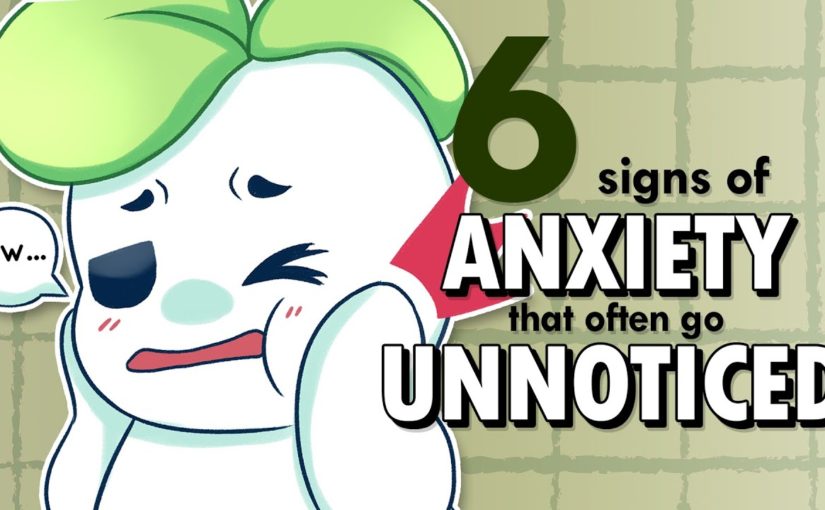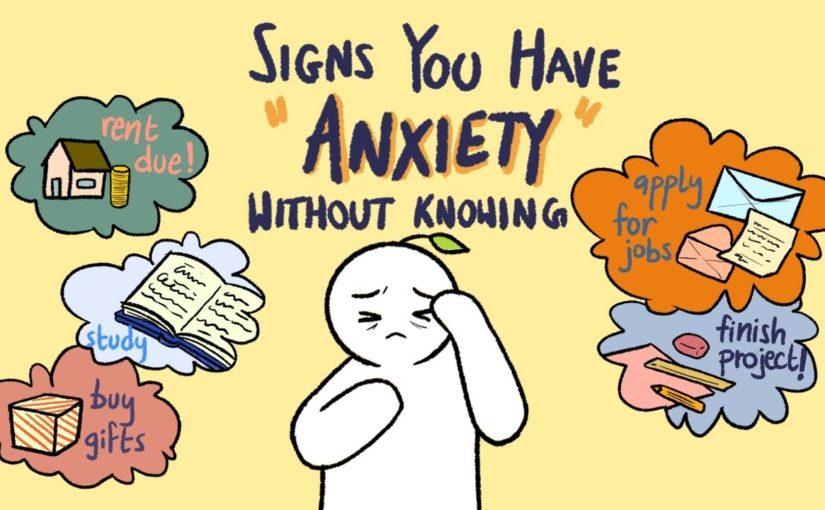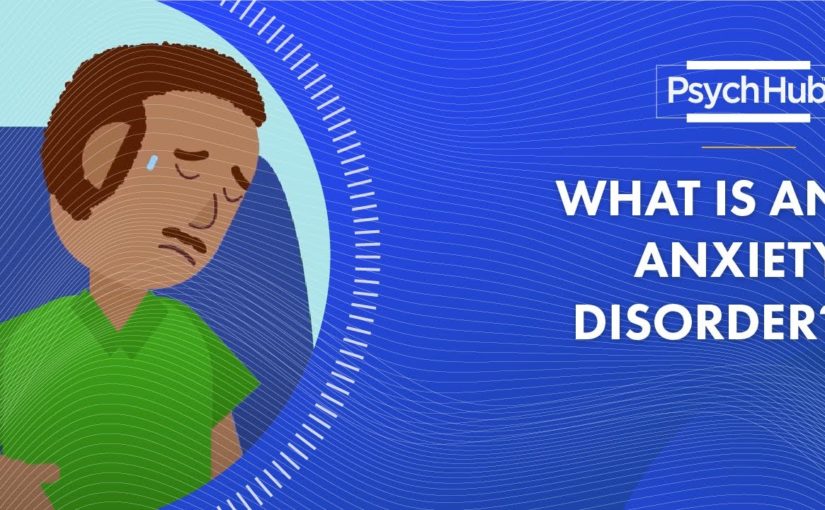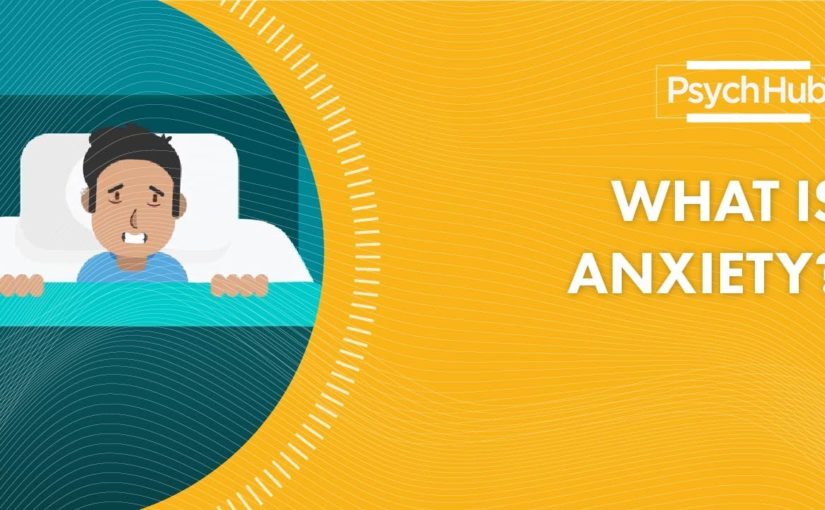– Hey, Psych2Go viewers,
Welcome back to our channel. Do you get bouts of
anxiety from time to time? This can be normal before a
first date or a job interview since these emotions often
subside after a while. But if your anxiety is persistent,
This can be concerning. Continuing to feel very
anxious, even after a date, job interview or speech can
indicate something else, an anxiety disorder. Does this sound familiar? If anxiety is something
that you deal with, you’re not alone. Approximately 19% of
Americans have experienced an anxiety disorder, and about 31% of Americans will experience an anxiety disorder in their lifetime. Many of us usually think of sweaty palms and heart palpitations
as symptoms of anxiety, but anxiety can manifest
itself in other ways too. Most of the other signs go unnoticed. So, what are they? Here are six signs of anxiety
that often go unnoticed. Number one, jaw pain. Have you ever noticed
jaw pain from anxiety? Anxiety is usually not the first thing you may think of when you
experience jaw pain or toothaches. You may usually blame a cavity
or another dental problem, but jaw pain and toothaches
can also be caused by anxiety. More specifically bruxism. This is when an individual
unconsciously and excessively grinds or clenches their teeth. Bruxism is a by-product of stress. When we’re stressed our
whole body clenches up in preparation to fight or flight, hence teeth grinding and jaw pain. Studies support this theory, stating that there is a high
index of anxiety among bruxers, as opposed to non-bruxers. But anxiety is not the only
mental health condition that causes this. People with depression and neuroticism can also experience toothaches
as a result of bruxism. The condition is usually
self-diagnosed and can be treated. Most teeth-grinding
activity happens overnight. So, you may not notice that early on. Morning tooth pain is
usually the first clue. If you wake up with jaw pain frequently, consider finding what
is causing you stress. It may take some time but always seek help from a licensed professional if necessary. Number two is scattered thinking. Another sign of anxiety,
scattered thinking. Anxiety floods, your thoughts
with negativity and doubts. Often these thoughts are disruptive, and can easily make you
forget your surroundings. You may come off as inattentive. While intrusive thoughts
can steal your attention, there’s also another reason why
you may feel scatterbrained. Anxiety can have neurological effects as well as physical ones. It affects your limbic system, specifically the prefrontal cortex. This part of the brain is known
for executive functioning, but it’s also responsible
for social behavior. When you’re anxious, your prefrontal cortex and other structures of your
limbic systems are impaired. As a result, you may find
that you lose the thread of a conversation or have
trouble concentrating on a task. If this is something to deal with often, try to ground yourself in the present. There are many wonderful
grounding techniques. The most popular one is box breathing. Wanna try? Okay. Breathe in for four seconds. One, two, three, four. Now hold for four. One, two, three, four. Now exhale for four. One, two, three, four. And then hold again for four. One, two, three, four. Ah! Better? I sped it up a little bit, but try to take your
time with it next time. Number three, cold feet. I’m sure you’ve heard the
term getting cold feet. There’s a reason this popular
idiom describes being nervous. When you’re anxious, perhaps similar to right
Before you get married, your body jumps into a fight or flight. This reaction triggers a
cascade of neurological and hormonal shifts. One of them is that it tells your brain to release adrenaline.

Adrenaline helps you
redirect your blood flow so that most of it is sent
to your vital organs, like your heart and lungs. Consequently, your extremities
start to feel cold. Number four is irritability. Do you easily become irritated? Irritability is a common sign of anxiety. However, it’s a symptom we
often overlook or ignore. It’s a sign that you’re
overwhelmed with stress. Anxiety is associated
with hypersensitivity, meaning that you’ll be much more sensitive to your surroundings, which may cause you to feel
more irritated than usual. Number five is impulsive buying. Another sign of anxiety is impulsivity. In this case, impulse buying. However, impulsivity can manifest itself in many ways, such
as engaging in risky behavior. Impulsivity because of anxiety can be due to numerous factors. The main one is that your
orbital frontal cortex, another branch of your
limbic system, is affected. Studies found that anxiety
increases the blood flow to that region, which
consequently, increases activity. An increase in activity can lead to either impulse control issues,
hoarding, or impulse spending. Additionally, anxiety affects
your prefrontal cortex and makes it harder for you to make wise and thoughtful decisions. Impulse buying, as well as hoarding, are also forms of self-soothing. They provide a false sense
of comfort and security. If you do find yourself caving in and taking financial risks, please consider reaching
out to a therapist for help. And number six, crying easily. When was the last time you cried? One last sign that goes
unnoticed is crying easily. Inexplicably bouts of crying can mean you’re overwhelmed by the
situation you find yourself in. Not only can it be because
of a sensitivity to stress, but it can also be due to
your fight or flight response. The correct terminology is
fight, flight, or freeze. Feeling stuck or freezing
amidst a perceived threat can progress these overwhelming
feelings of stress. When you find yourself crying, attempt to relax by taking a deep breath. Then allow yourself to cry. Crying can release all of those feelings you may be holding onto. It may be great to find
additional ways to self-soothe when you’re feeling anxious as well. So have you experienced
any of these signs? I have. What are some self-soothing
behaviors that help you? I enjoy walking. Feel free to let us know
in the comments below. Anxiety is quite common
and can be manageable. If you ever need help or guidance reaching out to a therapist
or mental health professional can be a good idea. Feel free to like and share
this video if it helped you, or if you think it
could help someone else. Don’t forget to hit the subscribe button and notification bell icon
for more videos like this. And thanks for reading, take care.
As found on YouTubeNatural Synergy $47.⁰⁰ New Non-Invasive Alternative. To Electro-Acupuncture, Producing Astounding Results… Self-Application Is Easy, Rapid Response. You’re about to discover how both chronic and acute pain, skin conditions, migraines, and hundreds of ailments all stem from the same root cause ꆛ Yin Yang
Ailments🗯 such as➯➱ ➫ ➪➬ Chronic pain immunity⇝Chronic acid reflux⇝High blood pressure⇝Addictions⇝Fibromyalgia⇝Allergies⇝Osteoarthritis⇝Headaches⇝Low back⇝pain Asthma⇝Headaches⇝Depression and anxiety⇝Urinary problems… to name just a few…

 Adrenaline helps you
redirect your blood flow so that most of it is sent
to your vital organs, like your heart and lungs. Consequently, your extremities
start to feel cold. Number four is irritability. Do you easily become irritated? Irritability is a common sign of anxiety. However, it’s a symptom we
often overlook or ignore. It’s a sign that you’re
overwhelmed with stress. Anxiety is associated
with hypersensitivity, meaning that you’ll be much more sensitive to your surroundings, which may cause you to feel
more irritated than usual. Number five is impulsive buying. Another sign of anxiety is impulsivity. In this case, impulse buying. However, impulsivity can manifest itself in many ways, such
as engaging in risky behavior. Impulsivity because of anxiety can be due to numerous factors. The main one is that your
orbital frontal cortex, another branch of your
limbic system, is affected. Studies found that anxiety
increases the blood flow to that region, which
consequently, increases activity. An increase in activity can lead to either impulse control issues,
hoarding, or impulse spending. Additionally, anxiety affects
your prefrontal cortex and makes it harder for you to make wise and thoughtful decisions. Impulse buying, as well as hoarding, are also forms of self-soothing. They provide a false sense
of comfort and security. If you do find yourself caving in and taking financial risks, please consider reaching
out to a therapist for help. And number six, crying easily. When was the last time you cried? One last sign that goes
unnoticed is crying easily. Inexplicably bouts of crying can mean you’re overwhelmed by the
situation you find yourself in. Not only can it be because
of a sensitivity to stress, but it can also be due to
your fight or flight response. The correct terminology is
fight, flight, or freeze. Feeling stuck or freezing
amidst a perceived threat can progress these overwhelming
feelings of stress. When you find yourself crying, attempt to relax by taking a deep breath. Then allow yourself to cry. Crying can release all of those feelings you may be holding onto. It may be great to find
additional ways to self-soothe when you’re feeling anxious as well. So have you experienced
any of these signs? I have. What are some self-soothing
behaviors that help you? I enjoy walking. Feel free to let us know
in the comments below. Anxiety is quite common
and can be manageable. If you ever need help or guidance reaching out to a therapist
or mental health professional can be a good idea. Feel free to like and share
this video if it helped you, or if you think it
could help someone else. Don’t forget to hit the subscribe button and notification bell icon
for more videos like this. And thanks for reading, take care.As found on YouTubeNatural Synergy $47.⁰⁰ New Non-Invasive Alternative. To Electro-Acupuncture, Producing Astounding Results… Self-Application Is Easy, Rapid Response. You’re about to discover how both chronic and acute pain, skin conditions, migraines, and hundreds of ailments all stem from the same root cause ꆛ Yin Yang Ailments🗯 such as➯➱ ➫ ➪➬ Chronic pain immunity⇝Chronic acid reflux⇝High blood pressure⇝Addictions⇝Fibromyalgia⇝Allergies⇝Osteoarthritis⇝Headaches⇝Low back⇝pain Asthma⇝Headaches⇝Depression and anxiety⇝Urinary problems… to name just a few…
Adrenaline helps you
redirect your blood flow so that most of it is sent
to your vital organs, like your heart and lungs. Consequently, your extremities
start to feel cold. Number four is irritability. Do you easily become irritated? Irritability is a common sign of anxiety. However, it’s a symptom we
often overlook or ignore. It’s a sign that you’re
overwhelmed with stress. Anxiety is associated
with hypersensitivity, meaning that you’ll be much more sensitive to your surroundings, which may cause you to feel
more irritated than usual. Number five is impulsive buying. Another sign of anxiety is impulsivity. In this case, impulse buying. However, impulsivity can manifest itself in many ways, such
as engaging in risky behavior. Impulsivity because of anxiety can be due to numerous factors. The main one is that your
orbital frontal cortex, another branch of your
limbic system, is affected. Studies found that anxiety
increases the blood flow to that region, which
consequently, increases activity. An increase in activity can lead to either impulse control issues,
hoarding, or impulse spending. Additionally, anxiety affects
your prefrontal cortex and makes it harder for you to make wise and thoughtful decisions. Impulse buying, as well as hoarding, are also forms of self-soothing. They provide a false sense
of comfort and security. If you do find yourself caving in and taking financial risks, please consider reaching
out to a therapist for help. And number six, crying easily. When was the last time you cried? One last sign that goes
unnoticed is crying easily. Inexplicably bouts of crying can mean you’re overwhelmed by the
situation you find yourself in. Not only can it be because
of a sensitivity to stress, but it can also be due to
your fight or flight response. The correct terminology is
fight, flight, or freeze. Feeling stuck or freezing
amidst a perceived threat can progress these overwhelming
feelings of stress. When you find yourself crying, attempt to relax by taking a deep breath. Then allow yourself to cry. Crying can release all of those feelings you may be holding onto. It may be great to find
additional ways to self-soothe when you’re feeling anxious as well. So have you experienced
any of these signs? I have. What are some self-soothing
behaviors that help you? I enjoy walking. Feel free to let us know
in the comments below. Anxiety is quite common
and can be manageable. If you ever need help or guidance reaching out to a therapist
or mental health professional can be a good idea. Feel free to like and share
this video if it helped you, or if you think it
could help someone else. Don’t forget to hit the subscribe button and notification bell icon
for more videos like this. And thanks for reading, take care.As found on YouTubeNatural Synergy $47.⁰⁰ New Non-Invasive Alternative. To Electro-Acupuncture, Producing Astounding Results… Self-Application Is Easy, Rapid Response. You’re about to discover how both chronic and acute pain, skin conditions, migraines, and hundreds of ailments all stem from the same root cause ꆛ Yin Yang Ailments🗯 such as➯➱ ➫ ➪➬ Chronic pain immunity⇝Chronic acid reflux⇝High blood pressure⇝Addictions⇝Fibromyalgia⇝Allergies⇝Osteoarthritis⇝Headaches⇝Low back⇝pain Asthma⇝Headaches⇝Depression and anxiety⇝Urinary problems… to name just a few…

































